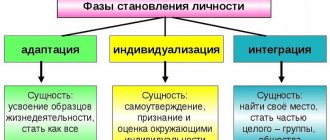Heredity
By heredity we mean those properties of an organism that are transmitted to children from parents through a certain genetic code. In this case, mainly physiological data is transmitted: the structure of the body, features of functioning, some diseases and inclinations for certain areas of activity (music, drawing).
If we talk about the concept of heredity, then the behavior and development of the individual are determined, first of all, due to the innate characteristics inherent in the formation of the organism. This can be confirmed by the expression “talent will always find its way,” even under negative life circumstances and growth conditions.
It is believed that congenital inclinations or, in other words, heredity are fundamental. However, is this so? There are situations when a person changes over the years and discovers new facets of ability or works on the formation and development of such.
And as for the root cause in physiological characteristics, we can recall the stories of a human baby entering the animal world from the first days of life. For example, the wolf article. It was only in the cartoon that Mowgli was strong and brave; in reality, such children did not have speech or communication skills, and their habits completely copied the animals that were nearby.
Maybe society plays a key role after all, because man is a social being? Let's analyze in more detail the second condition, which has a significant impact on personality development.
Emotions, feelings, will
For the formation of a preschooler as a harmonious personality, the development of his emotional-volitional sphere is also important, so parents should teach the child to feel. Fairy tales and cartoons will help, based on the plots of which you should talk with the baby, find out his impressions, and understand whether he correctly understood the feelings of the character.
Starting from the age of 4, children understand well the manifestations of emotions, they know that some of their actions will cause dissatisfaction with an adult, in addition, higher feelings are being formed. It is important for parents now to demonstrate their love, to be attentive to the baby, this will help create a positive attitude. However, it is unacceptable to unnecessarily pamper the baby, otherwise he may become selfish.
Habitat
Of course, the environment and communication with people largely determine the personality; the child absorbs the culture, norms and rules of behavior accepted in a certain society. And people of different nationalities and cultures can be radically different. Thus, we come to the conclusion that everything is closely interconnected.
Naturally, family, friends, kindergarten and school have a great influence on a person. The child is taught to certain norms and rules of behavior, and the foundations are laid for the formation of moral principles. Under the influence of the people around them, children learn role-playing games, behavior patterns, absorb and learn a huge amount of knowledge thanks to the school curriculum.
Proponents of the “environment” theory believe that a person, like a blank slate, comes into this world, and parents and environment write and create personality. However, we often hear comments that even in the same family, under equal conditions, children are completely different? This means that the natural principle also has a great influence on the development of personality.
So, there are two basic conditions - the external environment and heredity. The question arises: can a person independently influence his development or does everything depend on external factors?
Incentive sphere
Preschool childhood is a key and very important period of personality development. It is now that the formation of the main motives that will encourage the child to activity takes place. What is its specificity?
Motives appear related to the fact that the child strives to join adult life, to become more like his parents or their friends, to live like them. Often such motives are intertwined with the game, so kids often have fun playing “Mothers and Daughters”, “Shop” and the like.
In addition, we highlight the following motives:
- To be better than peers, a competitive element.
- Establishing and maintaining positive relationships with adults. It is extremely important for a child to be singled out, praised, and rejoiced at his achievements.
- Moral motives are obedience, helping others, the desire to somehow please them.
- The motives for learning are the acquisition of knowledge, skills and abilities.
It is common for a preschooler not to wait for praise, but to make some efforts to receive it. In addition, it is during this period that a hierarchy of motives arises, their subordination.
Personal influence
A person continues to develop throughout life. Naturally, everyone has certain inclinations, innate characteristics that we do not choose - there is a family and habitat that we can partially correct over time. How to be? A strong personality who knows what he wants will always strive for self-development, directing it towards the necessary character traits, abilities, and areas of life. Only through willpower and constant work can one influence these processes.
Moreover, philosophers consider work both literally and figuratively. Labor has made a person a person; in the process of activity and direction of his efforts, the person also develops and acquires certain skills. There is also professional growth, as one of the facets of a holistic personality.
Now psychologists are talking more and more about the personal factor of development and calling for responsibility for one’s life. It is wrong to say that I am the way nature created me and I can’t do anything; this is a passive position in life.
Environment
Determining exactly what is the main factor for personality development is problematic. But the environment and social environment in which a child grows up shapes his habits and views. Changing attitudes that have been instilled since childhood is the most difficult thing to do.
A person is predominantly surrounded by people of the same social status, religion, and mentality. We choose this natural soft segregation on our own, because it is easier to communicate and develop with “our own kind.” Read about relationships in this section. The environment can change under the influence of external circumstances - personal development will also turn in the other direction. It is human nature to adapt to their environment; only a few strive to stand out from it. A few of these units form their own environment and become people capable of changing the world.
The influence of the social environment on development can be seen in the biography of any historically famous person: Mikhail Lomonosov, Adolf Hitler, Steve Jobs and others. But this influence also needs to be considered in conjunction with other circumstances.
Views on Personality Development
For many years and centuries, discussions have continued on the topic of the conditions for the development of a person’s personality and influencing factors. V. Stern was inclined to the duality of human nature and the balance of biological and social factors as interconnected and inseparable in their influence.
S. Freud put forward another theory, suggesting a confrontation between two main factors in a person - the constant desire for pleasure and the reality of life. Freud in psychoanalysis considers personality at the level of basic instincts that influence life and the formation of personality - a person strives to realize and obtain the necessary pleasures and only morality, the norms of society, restrain him in this direction.
The theory was called "confrontation of two factors." At different times, this idea was supported by A. Adler and K. Jung. There were also psychologists who criticized Freud's assumptions, believing that they led to a strong opposition between the individual and society.
Everything flows and develops. New research has made it possible to discover a new biogenetic law of E. Haeckel and F. Muller, according to which ontogeny (individual development) is a short repetition of phylogeny (development of the species). These stages of development can be observed in the development of the embryo. This theory is quite interesting and partly true - man repeats his ancestors in his development.
Moreover, such reduced copying is not observed for all characteristics of the organism; some properties arise as a result of adaptation to the external environment. In the 30-70s of the 20th century, there was an opinion that a person in his development repeats the development of his species: an infant is at the stage of mammals, at the end of the first year - at the stage of a monkey, in the second year - reaches human development, in adulthood - the level of modern culture .
Quite an interesting theory, although personality development is a rather complex process, and it cannot be characterized by just one parameter. Rather, it is a complex of conditions and factors that inextricably influence a person. At the same time, a strong, stable personality independently shapes himself in the process of life to a greater extent than a weak-willed person who absorbs everything from his environment.
Education as a means to the development of individuality
Education is recognized as the main factor in the formation of personality. During the educational process, children actively interact with peers, adults and the environment, and in a different way - they are socialized in society.
Components of education
- A child is an object of education. During the period of socialization, he develops subjective values, establishes a certain vision, worldview, and acquires habits, knowledge, and applied skills.
Note! There is often a tendency to copy the behavior of adults and individuals, since the student is under the constant influence of older people and the environment. Therefore, adults must set an example of correct behavior!
- Adults are the initiators of educational action, but at the same time they themselves are subject to education in various life situations of society.
- Society - a collective - creates conditions for self-affirmation, self-improvement, and satisfaction of aesthetic and moral needs.
- Social environment - affects the quality of the educational process within society, home, school.
Social education as a social institution
Patterns of personality development
The development of personality, its formation is an interconnected and holistic process, which is characterized by stages of personality development. Let's think about the question: what are the patterns of personality development? Why does personality develop and how does it happen?
So, the main patterns of personality development:
- Age factor - the younger a person is, the faster his physical development occurs. Over time, the process slows down. There are similar observations about spiritual development; the younger a person is, the faster his spiritual growth occurs.
- Therefore, we often hear that young and old, children understand old people very well, they can quickly understand the story, show interest, absorb knowledge and feel the state of mind of the narrator.
- Uneven development is observed in the presence of certain periods of growth, which we observe in the development of our children. The body does not develop constantly, it seems to us that the child suddenly begins to grow at a certain stage, these are the physiological characteristics of the body. The same can be said about spiritual development - there is unevenness
At different times, a person’s properties can change and be at different levels of development. In life there are more favorable conditions for personal development and less favorable ones. However, these conditions will be temporary. What influences a person?
Of course, communication with the outside world and people, spiritual development occurs in the knowledge of the world and oneself. There are also leaps in the development and awareness of processes due to stressful situations that make fundamental changes in a person’s personality. “Every cloud has a silver lining,” people say. Even in times when the world seems to be collapsing, think about what you will build from scratch.
3. Fluctuations in development - the organs of the human body develop each at their own pace. This is reflected in mental and nervous processes. Basically, differences between people and the level of development are manifested in behavioral aspects, thinking, intellectual level, social and moral development.
Features of self-awareness
Self-awareness is a child’s understanding of himself, his qualities, and relationships with the surrounding reality. The most striking form of self-awareness is considered to be self-esteem, the way a child evaluates his achievements, personal qualities and capabilities. Initially, the baby does not have the opportunity to evaluate himself, so he uses the position of others. So, if the mother constantly tells the child that he is doing well, this is the position that will be imprinted on him.
In addition, the preschooler’s self-awareness should include:
- understanding of one’s gender (the child recognizes himself as a boy or a girl) and appropriate behavior;
- understanding one’s place in the world, one’s own social position, this most often happens by the beginning of primary school age. A child entering first grade already clearly understands that he is a school student.
The child develops new values and experiences, his inner life becomes more complicated, his actions and behavior change. It is very important to help him in this difficult process, since only in this way can the baby become an equal member of society.
Conditions for the development of human personality: motor skills and child development
For the spiritual development of a person, certain stages are distinguished - age limits characteristic for the acquisition of certain qualities. It is customary to call such periods “sensitive”. Based on research data, psychologists can determine whether a child is developmentally appropriate for his age or diagnose developmental delay.
Thus, for the development of speech, the optimal period is considered to be 1-2 years, and intellectual development most actively occurs before the age of 13. The basis of such periods is that the maturation of the nervous system and brain occurs not constantly, but in periods. Everything in the body is formed gradually and acquired experience plays a very important role.
Now there are special schemes of work to help children who have developmental delays, based on the complex use of treatment by a neurologist, sessions with a psychologist and speech therapist. As a rule, speech development is associated with the maturation of the cerebral cortex, and there are special methods to speed up such processes (medicines, sensory training, Montessori games).
With physical retardation, it often happens that children begin to walk later; there are also programs - massage, swimming, exercise therapy. It is very important to monitor these moments and help children develop comprehensively in time.
Qualities
Stability of qualities - as a result of personality development, a person acquires stable and permanent mental qualities, but plasticity is also preserved. The complexity of these processes comes down to the fact that a person acquires character traits and at the same time there is always the possibility of changing them and improving them under the right circumstances of life. Thanks to the plasticity of the nervous system, education is possible.
And besides, compensation occurs due to stronger personality traits. So, for example, there are children who grasp knowledge on the fly without working too hard, while others achieve results through hard work, which compensates for their weaker memory.
Every person has strengths and weaknesses, and the strong ones very often override the weak ones and allow them to successfully cope with life situations.
Integration
Personal development occurs as a merging of different spheres - intelligence, spiritual development, emotional component, spirituality. Each sphere integrates its own properties. So, emotional - feelings, intellectual - mind. Over time, a person’s psyche hardens and strengthens; in adulthood, a person reacts more calmly to life’s difficulties, with a sufficient level of development. In addition, a worldview and understanding of life processes are formed.
At every stage of life, a person has a dominant activity, which has a great impact on the development of personality.
During school years we study, acquire knowledge and communication skills. As adults, we learn in the process of interaction in the family, communication with loved ones, as well as the work team and profession leave their imprints, the professional development of the individual is formed. All this contributes to the formation of mental qualities and personality traits.
Controversy and progress
Contradictory personality is a quality that Freud and other psychologists talked about. Man is structured in a rather interesting way and is constantly in interaction with the world around him. At the same time, every day he makes decisions and makes life choices, and it happens that he goes against the grain of his immediate environment in his judgments and enters into confrontation.
We can also recall situations when we have an internal conflict and struggle between different parts of the personality - an adult, a child, a teacher. Or maybe this is a conflict between good and evil, it’s hard to say, the main thing is that in these moments the truth is born, it is important to find yourself and form the necessary qualities.
The desire for progress - it is natural that everyone wants to achieve success in life; in the process of overcoming life's obstacles, on the way to the goal, character is strengthened and the strong-willed qualities of the individual are formed. All life situations are lessons that we go through, and as a reward we receive a new “I”, with new and even better qualities.
Self-development
Personal self-development - we constantly improve ourselves by working on our inner world, subordinating mental processes and emotions to our will, improving character traits. Such work can be done either independently or through special training. Each person determines for himself how it is easier for him to develop. The main thing is the desire to achieve new results, constantly work on shaping your personality, and search for the necessary information and knowledge.
Development can also act as a protective function. A person is constantly developing, both physically and spiritually, this is necessary for survival in our world. A successful life requires certain qualities, such as immunity to fight diseases, willpower to achieve results, and patience is an important weapon for conquering peaks. Naturally, for a full life we need: good health, high intellectual and spiritual qualities, which we develop in the process of life, voluntarily or involuntarily, under the influence of life circumstances.
Thus, we have examined the patterns of personality development, and now we better understand the cause-and-effect relationships. Of course, our development is influenced by many factors, the conditions for the development of a person’s personality, and yet we are happy that we can correct our life and development through our own efforts.
Topic: Personal growth










